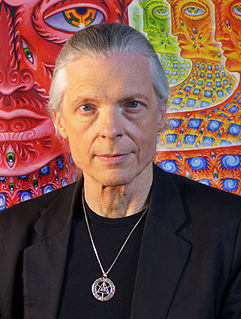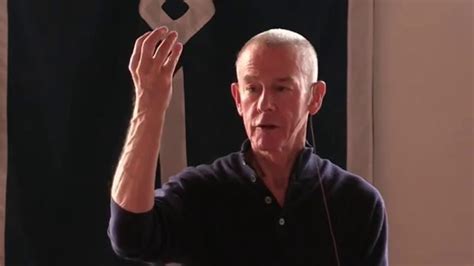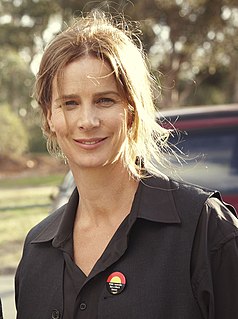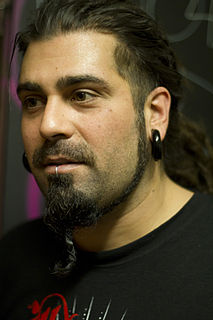Top 612 Tibetan Buddhist Quotes & Sayings - Page 10
Explore popular Tibetan Buddhist quotes.
Last updated on October 6, 2024.
Man is an onion made up of a hundred integuments, a texture made up of many threads. The ancient Asiatics knew this well enough, and in the Buddhist Yoga an exact technique was devised for unmasking the illusion of the personality. The human merry-go-round sees many changes: the illusion that cost India the efforts of thousands of years to unmask is the same illusion that the West has labored just as hard to maintain and strengthen.
If you exchanged wedding vows, tape them to your bathroom mirror and read them aloud to yourself every morning along with the ritual brushing of teeth. It's not realistic to believe that you will live your promises as a daily practice -- unless you're a saint or a highly evolved Zen Buddhist. Not where marriage is concerned. But you can make a practice of returning to your vows when the going gets rough.
Fans of different races, castes, ethnicities and religions who together celebrate their diversity by uniting for a common national cause. They are my foundation, they are my family. I will play my cricket for them. Their spirit is the true spirit of cricket. With me are all my people. I am Tamil, Sinhalese, Muslim and Burgher. I am a Buddhist, a Hindu, a follower of Islam and Christianity. I am today, and always, proudly Sri Lankan
What God is doing today is calling people out of the world for His name. Whether they come from the Muslim world, or the Buddhist world, or the Christian world, or the non-believing world, they are members of the body of Christ because they've been called by God. They may not even know the name of Jesus, but they know in their hearts they need something that they don't have and they turn to the only light they have and I think they're saved and they're going to be with us in heaven.
There is this persistent theme in all of these notions that death is made more easy, whatever that means, if you've learned the territory before you get there. And you know, in the Mahayana Buddhist situation it even becomes as extreme as saying; 'life is essentially a preparation for death, a studying of the maps of a learning of the skills a packing of your picnic basket so that when you get out there and demons are sniffing you up one side and down the other you don't bungle your mantras'.
As a book person and a movie person, I feel Jewish. My Dad was more Buddhist than anything, and on the West Coast I've often had the impression that Jews become Buddhists. I think, if anything, my religion has more to do with California consciousness, vibrations and energy. My wife isn't Jewish. There's nothing ceremonial going on at our house, I mean, occasionally a candle gets lit. But, definitely, my Judaism is an ongoing relationship, one that remains to be consummated.
Imagine a multidimensiona l spider's web in the early morning covered with dew drops. And every dew drop contains the reflection of all the other dew drops. And, in each reflected dew drop, the reflections of all the other dew drops in that reflection. And so ad infinitum. That is the Buddhist conception of the universe in an image.
I think East Asian countries, I think they're very fortunate to have Buddhism survive as a strong influence because right from the time when Buddha himself, 2,500 years ago, made the point about the importance of education, and the word "Buddha" also means enlighten[ed] or educated. So all the Buddhist countries, not only Japan and Korea and China and Hong Kong and Thailand but also even Burma and Sri Lanka, had a higher level of education.
Taoist chanting, Confucian chanting, Christian chanting, Buddhist chanting don't matter. Chanting Coca Cola, Coca Cola, Coca Cola … can be just as good if you keep a clear mind. But if you don't keep a clear mind, and are only following your thinking as you mouth the words, even the Buddha cannot help you.
......the interesting thing was that the Roman Catholic monks and the Buddhist monks had no trouble understanding each other. Each of them was seeking the same experience and knew that the experience was incommunicable. The communication is only an effort to bring the hearer to the edge of the abyss; it is a signpost, not the thing itself. But the secular clergy reads the communication and gets stuck with the letter, and that's where you have the conflict.
Love is the capacity to take care, to protect, to nourish. If you are not capable of generatng that kind of energy toward yourself - if you are not capable of taking care of yourself, of nourishing yourself, of protecting yourself - it is very difficult to take care of another person. In the Buddhist teaching, it's clear that to love oneself is the foundation of the love of other people. Love is a practice. Love is truly a practice.
Human beings by nature want happiness and do not want suffering. With that
feeling everyone tries to achieve happiness and tries to get rid of suffering, and everyone has the basic right to do this. In this way, all here are the same, whether rich or poor, educated or uneducated, Easterner or Westerner, believer or non-believer, and within believers whether Buddhist, Christian, Jewish, Muslim, and so on. Basically, from the viewpoint of real human value we are all the same.
I've always been fond of the idea expressed in Buddhist art, that there are certain objects that, just by seeing them, can plant a seed for liberation in the individual. That class of objects is called "liberation through seeing." Certain Buddha images are like that, but if it were possible, I would like to find contemporary non-traditional sacred images. Maybe it sounds pretentious, but most spiritual paths point to the possibility that we all can access the deep, absolute dimensions of reality.
Mythology is not a lie, mythology is poetry, it is metaphorical. It has been well said that mythology is the penultimate truth--penultimate because the ultimate cannot be put into words. It is beyond words. Beyond images, beyond that bounding rim of the Buddhist Wheel of Becoming. Mythology pitches the mind beyond that rim, to what can be known but not told.
Buddhist words such as compassion and emptiness don't mean much until we start cultivating our innate ability simply to be there with pain with an open heart and the willingness not to instantly try to get ground under our feet. For instance, if what we're feeling is rage, we usually assume that there are only two ways to relate to it. One is to blame others. Lay it all on somebody else; drive all blames into everyone else. The other alternative is to feel guilty about our rage and blame ourselves.
As a Buddhist, I view death as a normal process, a reality that I accept will occur as long as I remain in this earthly existence. Knowing that I cannot escape it, I see no point in worrying about it. I tend to think of death as being like changing your clothes when they are old and worn out, rather than as some final end. Yet death is unpredictable: We do not know when or how it will take place. So it is only sensible to take certain precautions before it actually happens.
Not Christian or Jew or Muslim, not Hindu, Buddhist, sufi, or zen. Not any religion or cultural system. I am not from the East or the West, not out of the ocean or up from the ground, not natural or ethereal, not composed of elements at all. I do not exist, am not an entity in this world or the next, did not descend from Adam or Eve or any origin story. My place is placeless, a trace of the traceless. Neither body or soul. I belong to the beloved, have seen the two worlds as one and that one call to and know, first, last, outer, inner, only that breath breathing human being.
Both my parents were agnostic. My mother was kind of a Buddhist. She had some spiritual tendencies, but they were kind of flaky - New Agey, you know? Which is partly why I'm suspicious of that sort of thing. I'm skeptical of any spiritual practice that doesn't involve other people and doesn't involve some sort of consistent tradition.
Only Zorbas become Buddhas - and Buddha was never a monk, A monk is one who has never been a Zorba and has become enchanted by the words of Buddhas. A monk is an imitator, he is false, pseudo. He imitates Buddhas. He may be Christian, he may be Buddhist, he may be a Hindu - that doesn't make much difference - but he imitates Buddhas.
I'm working at trying to be a Christian and that's serious business. It's like trying to be a good Jew, a good Muslim, a good Buddhist, a good Shintoist, a good Zoroastrian, a good friend, a good lover, a good mother, a good buddy?it's serious business. It's not something where you think, Oh, I've got it done. I did it all day, hotdiggety. The truth is, all day long you try to do it, try to be it, and then in the evening if you're honest and have a little courage you look at yourself and say, Hmm. I only blew it eighty-six times. Not bad.
Crucial to how we feel is being aware of how we are feeling in the moment. The sine qua non of that is to realize that you are being emotional in the first place. The earlier you recognize an emotion, the more choice you will have in dealing with it. In Buddhist terms, it's recognizing the spark before the flame. In Western terms, it's trying to increase the gap between impulse and saying or doing something you might regret later.
Then another thing, now this is mainly for our interest about Tibet, our struggle. Whole struggle depend on within person. For dangerous. Foolish! Not for this only institution or even not only for Buddhist dogma, but before national sort of right, our right. So therefore this struggle must carried by people themselves.
When you climb a ladder and arrive on the sixth step and you think that is the highest, then you cannot come to the seventh. So the technique is to abandon the sixth in order for the seventh step to be possible. And this is our practice, to release our views. The practice of nonattachment to views is at the heart of the Buddhist practice of meditation.
It is neither just the religious, the spiritual, the power-hungry, the evil, the ignorant, the corrupt, the Christian, the Muslim, the Hindu, the Buddhist, the Jew, nor the atheist that makes a hypocrite, but being a human being. Any man who thinks himself to be free of hypocrisy while committed to cherry-picking others for such, I am confident, the Almighty can prove to him a great deal of his own hypocrisy even beyond his earthly comprehension.
God is not a Christian, God is not a Jew, or a Muslim, or a Hindu, or a Buddhist. All of those are human systems which human beings have created to try to help us walk into the mystery of God. I honor my tradition, I walk through my tradition, but I don't think my tradition defines God, I think it only points me to God.
I think a lot of people trying to follow Buddhism these days are getting confused about sex and they don't understand what's going on. They've been exposed to a contemporary Christian idea that sex itself is evil and bad, which I'm not so sure was Jesus' idea. For me, the Buddhist approach isn't that sex itself is evil or bad but that sex is neutral. It's the way you do it that can problematic.
But the solution to the riddle of life and space and time lies outside space and time. For, as it should be abundantly clear by now, nothing inside a frame can state, or even ask, anything about that frame. The solution, then, is not the finding of an answer to the riddle of existence, but the realization that there is no riddle. This is the essence of the beautiful, almost Zen Buddhist closing sentences of the Tracticus: "For an answer which cannot be expressed the question too cannot be expressed. The riddle does not exist."
I have learned so much from God that I can no longer call myself a Christian, a Hindu, a Muslim, a Buddhist, a Jew. The Truth has shared so much of Itself with me that I can no longer call myself a man, a woman, an angel, or even a pure Soul. Love has befriended me so completely it has turned to ash and freed me of every concept and image my mind has ever known.
The word mantra comes from two Sanskrit words man, ("to think") and tra ("tool'). So the literal translation is "a tool of thought." And that's how mantras are used in Buddhist and Hindu practices, as tools that clear your mind of distractions. Because when you focus on repeating that mantra over and over again, soon the noise will die down and all you will hear is your inner voice.
I'm not [a Buddhist]. The whole point of anything that is really, truly valuable to your soul, and your own growth, is not to attach to a teacher, but rather to find out what the real deal is in the world itself. You become your own guide. The teachings can help you, but really, we're all here with the opportunity the reality of hereness. We all have that. I trust that...I'm just not interested in labels. I find all of them constrictive. They're hard to wear. And they're hard to wear because we're always - hopefully - growing.
The way of presentation is different according to each religion. In theistic religions like Buddhism, Buddhist values are incorporated. In nontheistic religions, like some types of ancient Indian thought, the law of karma applies. If you do something good, you get a good result. Now, what we need is a way to educate nonbelievers. These nonbelievers may be critical of all religions, but they should be decent at heart.
Would you say that any one sacred book is superior to all others in the world? ... I say the New Testament, after that, I should place the Koran, which in its moral teachings, is hardly more than a later edition of the New Testament. Then would follow according to my opinion the Old Testament, the Southern Buddhist Tripitaka, the Tao-te-king of Laotze, the Kings of Confucius, the Veda and the Avesta.
Dharma is not about credentials. It's not about how many practices you've done, or how peaceful you can make your mind. It's not about being in a community where you feel safe or enjoying the cachet of being a 'Buddhist.' It's not even about accumulating teachings, empowerments, or 'spiritual accomplishments.' It's about how naked you're willing to be with your own life, and how much you're willing to let go of your masks and your armor and live as a completely exposed, undefended, and open human person.
They have no business administering government policies in a country that favors freedom and equality. ... Can you imagine having the Ayatollah Ruhollah Khomeini as defense minister, or Mahatma Gandhi as minister of health, education, and welfare The Hindu and Buddhist idea of karma and the Muslim idea of kismet, or fate condemn the poor and the disabled to their suffering. ... It's the will of Allah. These beliefs are nothing but abject fatalism, and they would devastate the social gains this nation has made if they were ever put into practice.
Franz Kafka once said that happiness consists in having an ideal and not progressing towards it. If you did progress towards it, you'd be unhappy because you'd never be able to reach it. You can incrementally improve your life, but you never quite experience the glamour. You never quite get to your utopia, or whatever it is. And once you realize that you can be quite Buddhist about it, and say, "Well, okay, I'm just going to keep detached from it all."
I think it would help if, when people are first ordained, they underwent a period of strict training, maybe for several years. During this time they would learn basic Buddhist philosophy in a monastic community where all the teaching and training was directed toward living a perfect monastic life and wasn't channeled out to fit into the lay life - which is what usually happens in Dharma centers where the teachings are directed toward how to live the Dharma in your everyday life.
"Moksha" is really a satire of myself. I've always been interested in Eastern spirituality. I'm particularly interested in enlightenment and the spiritual pursuit to liberate ourselves (I'm a Buddhist at heart). During my teenage years, I imagined I'd end up going to India to become a yogi; study with the last living saints in a cave; give up all my worldly possessions; learn to levitate. And there's still part of me that can see myself "disappearing" for some years at an ashram somewhere.
The question has often been asked; Is Buddhism a religion or a philosophy? It does not matter what you call it. Buddhism remains what it is whatever label you may put on it. The label is immaterial. Even the label 'Buddhism' which we give to the teachings of the Buddha is of little importance. The name one gives is inessential.... In the same way Truth needs no label: it is neither Buddhist, Christian, Hindu nor Moslem. It is not the monopoly of anybody. Sectarian labels are a hindrance to the independent understanding of Truth, and they produce harmful prejudices in men's minds.
Although I'm not Christian, I was raised Christian. I'm an atheist, with a slight Buddhist leaning. I've got a very strong sense of morality - it's just a different morality than the loud voices of the Christian morality.... I can't tell you how many films I've turned down because there was an absence of morality. And I don't mean that from any sort of Judeo-Christian-Muslim point of view. I'm not saying they're wrong and can't be made. But, fundamentally, I'm such a humanist that I can't bear to make films that make us feel humanity is more dark than it is light.
The identity of just one thing, the "clash of civilization" view that you're a Muslim or a Hindu or a Buddhist or a Christian, I think that's such a limited way of seeing humanity, and schools have the opportunity to bring out the fact that we have hundreds of identities. We have our national identity. We have our cultural identity, linguistic identity, religious identity. Yes, cultural identity, professional identity, all kinds of ways.
Ignorance, vulnerability, fear, anger, and desire are expressions of the infinite potential of your buddha nature. There's nothing inherently wrong or right with making such choices. The fruit of Buddhist practice is simply the recognition that these and other mental afflictions are nothing more or less than choices available to us because our real nature is infinite in scope.
I live for the moment. I'm basically a Buddhist-type person. I'm just here right now, and I don't think about what's going to happen a hundred years from now. I try to concentrate on what's going on right now. But I'm really trying to run this company like it is going to be here a hundred years from now. That's what's important.
Celibacy is one of the most unnatural things. It has destroyed so many human beings - millions - Catholic monks, Hindu monks, Buddhist monks, Jaina monks, nuns. For centuries they have been teaching celibacy; and the most amazing thing is, even in the twentieth century, not a single medical expert, physiologist, has stood up and said that celibacy is impossible, that in the very nature of things, it cannot happen.
While the primary function of formal Buddhist meditation is to create the possibility of the experience of "being," my work as a therapist has shown me that the demands of intimate life can be just as useful as meditation in moving people toward this capacity. Just as in formal meditation, intimate relationships teach us that the more we relate to each other as objects, the greater our disappointment. The trick, as in meditation, is to use this disappointment to change the way we relate.
From a Buddhist point of view, the actual experience of death is very important. Although how or where we will be reborn is generally dependent on karmic forces, our state of mind at the time of death can influence the quality of our next rebirth. So at the moment of death, in spite of the great variety of karmas we have accumulated, if we make a special effort to generate a virtuous state of mind, we may strengthen and activate a virtuous karma, and so bring about a happy rebirth.
I never really wanted to have a Guru, I was more interested in Buddhist philosophy and meditation, and had a psychological background in college, but he had so much love. To be with him, there was nowhere else to be and nothing else to do. Nothing he taught, philosophy or meditation, are the things I went to India to look for, or was interested in, but he sort of jumped into my heart and then pulled, he pried it open.
In Buddhist ideology, the conventional self is that which is constructed in a way by the use of the pronoun, and when you realize there is no absolute ego there, no disconnected one, self, or ego, then that actually strengthens your conventional ego. It does so in the sense that then you realize it's a construction, and you can strengthen it in order to help others, or do whatever you're trying to do, it's not like you no longer know who you are. Then you can organize your behavior by using your ego, as it's now the pronoun.
We cannot avoid the globalization of knowledge and information. When I was a boy growing up in Kansas, I could never think about a Buddhist, or a Hindu, or Muslim, or even a Protestant - I grew up in such a Catholic ghetto. That's not possible anymore, unless you live in a cave or something. So either we have knowledge of what the other religions and other denominations are saying, and how they tie into the common thread, or we end up just being dangerously ignorant of other people and therefore prejudiced.
When I ask people to contemplate selflessness, the sometimes react as if I've asked them to put their house on the market or give away all their money. If there was a self that existed in the way we think, discovering selflessness would be like putting our house on the market. But in the Buddhist tradition, the discovery of selflessness is called "completely joyful." It's not called "the raw end of the deal," or "I'd rather go back to bed," or "This is scary and depressing."
You can call it tathata, suchness. 'Suchness' is a Buddhist way of expressing that there is something in you which always remains in its intrinsic nature, never changing. It always remains in its selfsame essence, eternally so. That is your real nature. That which changes is not you, that is mind. That which does not change in you is buddha-mind. You can call it no-mind, you can call it samadhi, satori. It depends upon you; you can give it whatsoever name you want. You can call it christ-consciousness.
Within the framework of the Buddhist Path, reflecting on suffering has tremendous importance because -realizing the nature of suffering, you will develop greater resolve to put an end to the causes of suffering and the unwholesome deeds which lead to suffering. And it will increase your enthusiasm for engaging in the wholesome actions and deeds which lead to happiness and joy.
Karma is the record of services. Karma is the term used in Buddhist teaching. Taoists use the term te. Christians us the term "deed." Many other spiritual beings use the term "virtue." Karma, te, deed, and virtue are the same thing but in different words. To understand karma is to understand all of these words.
I'm not sure if Cupitt himself still uses this term, but it's useful in suggesting that, actually, there are more choices than the choice between nihilism and faith. In fact, the issue may not be faith as such but the fact that for millennia, Christianity has buttressed itself with a particular kind of metaphysics that has now seemingly reached the end of its life-span. But perhaps Buddhist metaphysics could provide an alternative here - or, at least, offer a direction of travel.













































